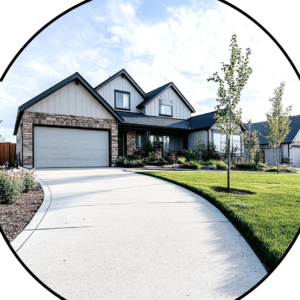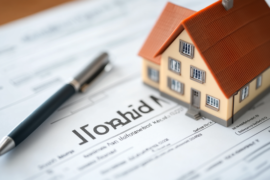This article may contain references to products or services from one or more of our advertisers or partners. We may receive compensation when you click on links to those products or services. Nonetheless, our opinions are our own.
The information presented in this article is accurate to the best of our knowledge at the time of publication. However, information is subject to change, and no guarantees are made about the continued accuracy or completeness of this content after its publication date.
This guide outlines the potential benefits and drawbacks of homeownership loans, helping readers discover which mortgage type best suits their home-buying goals. The complete advisory in this guide also helps readers select the right mortgage.
Homeownership awaits those who have decided to take this path. Creating the right mortgage is a fundamental choice for anybody who wants to own a home. Future house buyers need to study the pros and cons of different mortgage plans on the market. The following overview identifies every major element homeowners should assess to find suitable mortgages according to their financial needs and lifestyle goals.
Understanding the Pros and Cons of Different Mortgage Options
The choice of mortgage requires thoroughly comprehending each mortgage plan’s advantages and disadvantages. Standard mortgage choices will be examined in this text according to their advantages and disadvantages.
Fixed-Rate Mortgages
Available to organizations that choose fixed-rate mortgages, fiscal stability arrives due to the constant interest rate throughout the entire loan period. During the entire mortgage period, the interest payment remains constant, which enables easier financial planning. People who pick these mortgage agreements must accept initial payment costs that exceed what adjustable-rate options typically cost.
Pros:
- Consistent monthly payments
- Protection against rising interest rates
Cons:
- Higher initial interest rates
- Less flexibility if rates decrease
Adjustable-Rate Mortgages (ARMs)
The starting rate of an ARM is below market level, but loans adjust their rates according to market conditions while they remain active. Homeowners who stay a short time in their residence and individuals who predict their earnings will grow would choose this solution.
Pros:
- Lower initial payments
- The rates of these loans offer potential cost benefits to buyers when the market rate decreases.
Cons:
- The declining value of this loan happens because interest rates increase.
- Less predictability for long-term budgeting
Government-Backed Loans
Homebuyers cannot get regular mortgages but qualify for FHA, VA, and USDA loan programs. People seeking these mortgage choices benefit from relaxed credit requirements and reduced deposit criteria.
Pros:
- Easier qualification for some borrowers
- Lower down payment requirements
Cons:
- Mortgage insurance premiums (for FHA loans)
- Property restrictions (for USDA loans)
Fixed-Rate Mortgages: Stability and Predictability

When weighing the pros and cons of mortgage options, fixed-rate mortgages lead the way when choosing home loans because they offer dependable payment conditions across the mortgage duration. Fixed-rate home loans provide buyers with transparent financial predictability because they maintain a constant interest rate from the beginning to the end of the mortgage term.
Advantages of Fixed-Rate Mortgages
A fixed-rate mortgage enables users to receive payments that never change throughout the loan period. Your payment, consisting of principal and interest, maintains a steady rate regardless of any market conditions or economic watersheds. Budgeting simplicity and financial security occur with a fixed-rate mortgage system because payments remain stable, benefiting home purchasers, especially those with locked-down incomes.
Your insurance against rising interest rates derives from the use of fixed-rate mortgages. When interest rates rise, but you locked rates before, your original fixed mortgage amount remains beneficial. High interest rate conditions will boost your financial savings substantially throughout the entire duration of your loan.
Considerations and Potential Drawbacks
A fixed-rate mortgage has numerous benefits but presents certain disadvantages to users. Fixed-rate mortgages tend to enter the market with higher interest rates than adjustable-rate mortgages (ARMs). Homeowners who need to sell or refinance before a few years have passed will incur extra interest expenses.
Choosing the Right Fixed-Rate Term
Fixed-rate mortgages exist for 15 years, 20 years, and 30 years. The longer duration of your house purchase mortgage results in reduced monthly costs yet produces higher overall interest expenses. Higher monthly payments are required when choosing short loan durations because this strategy quickens your property value growth while decreasing your loan payments and accumulated interest. Choosing between different fixed-term mortgages depends on your budget requirements, how secure your financial situation is, and your fit future planning.
Voted "Best Overall Budgeting App" by Forbes and WSJ
Monarch Money helps you budget, track spending, set goals, and plan your financial future—all in one app.
Get 50% OFF your first year with code MONARCHVIP
Adjustable-Rate Mortgages: Flexibility and Potential Savings
Adjusted mortgage interest rate terms in ARMs create exclusive financing advantages by providing borrowers with flexibility and possible savings potential. Because of their variable interest rates, ARM mortgages produce opportunities and substantial dangers.
Initial Lower Rates
ARMs appeal to homebuyers because they offer the initial advantage of charging interest rates below fixed-rate mortgages. Lower loan payments during the early years enable you to purchase an expensive house or develop additional investments.
Potential for Long-Term Savings
An ARM becomes more valuable for homeowners when interest rates maintain their current levels or decrease as primary mortgage costs reduce throughout every loan term. When homeowners choose adjustable-rate mortgages, they benefit, especially when they sell their house or re-finance before their fixed-rate period ends.
Flexibility for Changing Circumstances
Those planning financial or residential changes should use ARMs as their mortgage option. Homeowners expecting payment increases and moving within multiple years should use ARMs because the initial discounted payments directly advance their future goals.
Understanding the Risks
Potential benefits from using ARMs become evident. However, you should weigh them against their significant risks. Market interest rate increases may cause modified monthly payments to become unaffordable for your budget. The complex terms and conditions of certain ARMs create an understanding barrier unless you consult with a mortgage expert.
Also Learn: Mortgage Rates vs Home Prices: What Makes Mortgage Rates Change
Tips for Choosing the Right Mortgage Loan for Your Needs

Your financial future depends heavily on choosing the correct mortgage since this selection will have a fundamental impact. You should scrutinize each mortgage option and distinguish its advantages and disadvantages to reach your decision smartly. Reading the following guidelines will help approach this critical process effectively:
Assess Your Financial Situation
A thorough evaluation of your fiscal state should precede any mortgage option assessment process. Consider factors such as:
- Your credit score
- Monthly income and expenses
- Down payment savings
- Long-term financial goals
Compare Different Mortgage Types
Become knowledgeable about the distinct mortgage types available in the market, which consist of:
- Fixed-rate mortgages
- Adjustable-rate mortgages (ARMs)
- Government-backed loans (FHA, VA, USDA)
- Conventional loans
Consider Loan Terms and Interest Rates
Understand the durations of available loan terms by looking at their common range extending between 15 to 30 years. Your borrowing cost decreases while your monthly payments rise when you choose mortgage terms under ten years. Longer than fifteen-year loans have less expensive monthly installments but imply that you will pay more for your mortgage over time. Multiple loan providers should be consulted for home loan interest rates to secure the best offer.
Factor in Additional Costs
The total expenses should include your mortgage costs and separate charges for private mortgage insurance, property taxes, homeowners insurance, and closing fees.
- Private mortgage insurance (PMI)
- Property taxes
- Homeowners Insurance
- Closing costs
Also Learn: Impact of Rising Mortgage Rates on the Housing Market
Conclusion
Deciding on a mortgage depends entirely on your financial standing and house-buying objectives. Study all available loan options and review rates from many lenders before determining total borrowing expenses over time. Effort becomes worthwhile when you find the perfect mortgage to buy your home.

Reviewed and edited by Albert Fang.
See a typo or want to suggest an edit/revision to the content? Use the contact us form to provide feedback.
At FangWallet, we value editorial integrity and open collaboration in curating quality content for readers to enjoy. Much appreciated for the assist.
Did you like our article and find it insightful? We encourage sharing the article link with family and friends to benefit as well - better yet, sharing on social media. Thank you for the support! 🍉
Article Title: Weighing the Pros and Cons: Selecting the Right Mortgage
https://fangwallet.com/2025/03/18/weighing-the-pros-and-cons-selecting-the-right-mortgage/The FangWallet Promise
FangWallet is an editorially independent resource - founded on breaking down challenging financial concepts for anyone to understand since 2014. While we adhere to editorial integrity, note that this post may contain references to products from our partners.
The FangWallet promise is always to have your best interest in mind and be transparent and honest about the financial picture.
Become an Insider

Subscribe to get a free daily budget planner printable to help get your money on track!
Make passive money the right way. No spam.
Editorial Disclaimer: The editorial content on this page is not provided by any of the companies mentioned. The opinions expressed here are the author's alone.
The content of this website is for informational purposes only and does not represent investment advice, or an offer or solicitation to buy or sell any security, investment, or product. Investors are encouraged to do their own due diligence, and, if necessary, consult professional advising before making any investment decisions. Investing involves a high degree of risk, and financial losses may occur including the potential loss of principal.
Source Citation References:
+ Inspo
There are no additional citations or references to note for this article at this time.












































